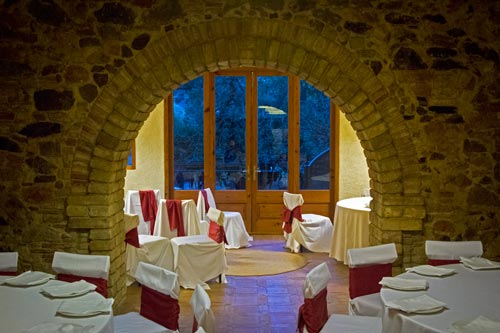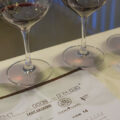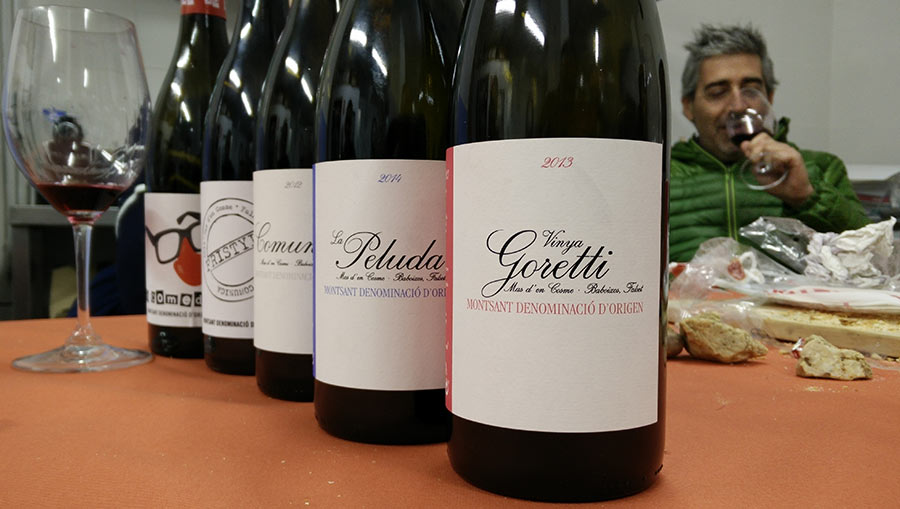
The first thing to realize with Hostal Sport is that it’s not an inn (“hostal” in Spanish) and not a place for “sport” but rather a fantastic four star hotel and restaurant in the Priorat region. The name comes from a time in the early 20th century when it was a smaller establishment where people traveling south would stop for a rest and something to eat. In those days it was believed that “sport” should be in the name of any cool bar, cafe or hotel in town, as the current member of the family to run it, Marta Domènech told us. She had invited us up for a quick stay and a sample of the Priorat/Montsant wine offer last week. Naturally we took her up on it as we generally only know Priorat and Montsant through the bottles we’ve picked up in the wine shops of Barcelona.
It all starts with the drive to Priorat. As you leave Barcelona behind going south, you eventually pass through flat Penedés only to leave it behind as well. Then, you take a turn for the mountains and climb upwards steadily, passing old stone villages until you come upon the valley where Priorat lies surrounded by the Montsant range. There, at the more southern end of it is Falset and in the center of this charming town is Hostal Sport. Falset, with its 3,000 inhabitants, is the capital of the county and also the largest town in Priorat.

The foundations of Hostal Sport are an old, stone building where Marta showed us one of their banquet halls that was being set up for an event the next day (they regularly host business meetings, weddings and and all sorts of social events). Even further below this is the wine cellar where they store the 200 different wines that they have on the impressive wine list in the restaurant.
When looking around the 28 rooms and other areas of the hotel, it looks surprisingly modern despite how old it is (Marta’s family have been the owners for four generations). Unfortunately this update in décor came at the rather large price of a fire five years ago that destroyed a huge section of the hotel. While difficult, they rebuilt and have recovered well with a hotel that offers double rooms for 95€ which, in Barcelona is what you pay for less than stellar places in a central location. It’s part of the joy of getting in to the Catalan countryside where your money goes further and your stays feel more luxurious.

Another benefit of that countryside is the food. Those who have been to Barcelona have probably had more than their fill of shitty paellas chosen from menus in 20 languages. This is not to be found at Hostal Sport. Nor will you find the trendy, super-manipulated dishes that, while wowing critics and yuppies will probably leave you hungry. Okay, sure, you find the occasional item like the shrimp carpaccio pictured above. But, drizzled with some of the local olive oil, it’s focused much more on being fresh and delicious as opposed to molecular-dickery.
Their dishes are all authentic to the region, hearty, and delicious. I was forced to waddle out of the dining hall after eating every last bite of this incredibly tender beef dish which came after having stuffed my face with luscious canelons and creamy croquetes. In spite of this, I had to try one of their traditional desserts, menjar blanc with local hazelnuts.
Including polishing off a bottle of wine, I have no idea how the room and my eventual placement within it came to be. The wine, by the way, was really interesting and made us want to visit the winery on our next trip to Priorat. It was a certified organic wine called, Mas Sinén by Celler Burgos-Porta in Poboleda, chosen by Marta Domènech who seems to have a knack for knowing exactly what one wants at any given moment.
Oh… and then there’s the breakfast.

Southern European breakfasts tend to be rather scant and just toast and coffee at most. But, there is a tradition of eating something a bit heartier in the middle of the morning (around 11-11:30 in Spain), especially as you get inland. And, this is what they serve at Hostal Sport with a full range of cured meats, cheeses, fresh orange juice, eggs, Catalan bacon, and an apple tart that they make themselves. Needless to say, we only needed to drink our lunch with such a strong foundation.
And drink we did as in addition to the stay at the hotel, Marta set us up with winery visits at Clos Figueres and Celler Mas Roig which we’ll talk more about shortly.



“…while wowing critics and yuppies will probably leave you hungry” I like that, I just came back from three days hiking in Central Bosnia and was delighted to eat the real food (zeljanica, sirnica, ćevapi…) and not artistic compositions on the plate that is becoming trendy in Istria as well.
Nice to see they also have marenda in Catalonia, and the timing is also the same: 11-11.30 AM! :)
Oh yes, merienda is a religion in Spain. I’m sure many tourists confuse people having it at 11-12 with Spaniards having actual lunch.
You might want to view this video from the Bourdain Croatia episode as it wasn’t part of the televised episode, but more accurately sums up the food scene in Croatia right now http://www.travelchannel.com/video/the-future-of-croatia-cuisine But yes, toss a basic 20 plate of ćevapi from Željo (I or II) in Sarajevo and I’m a happy man.